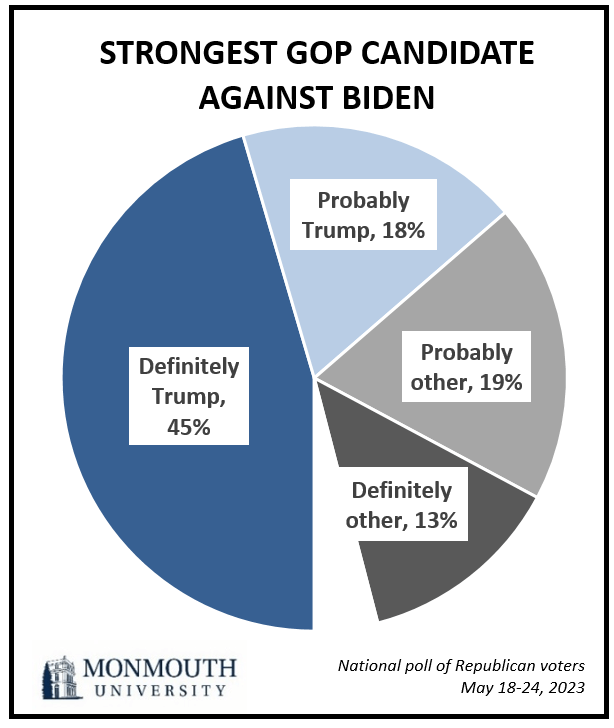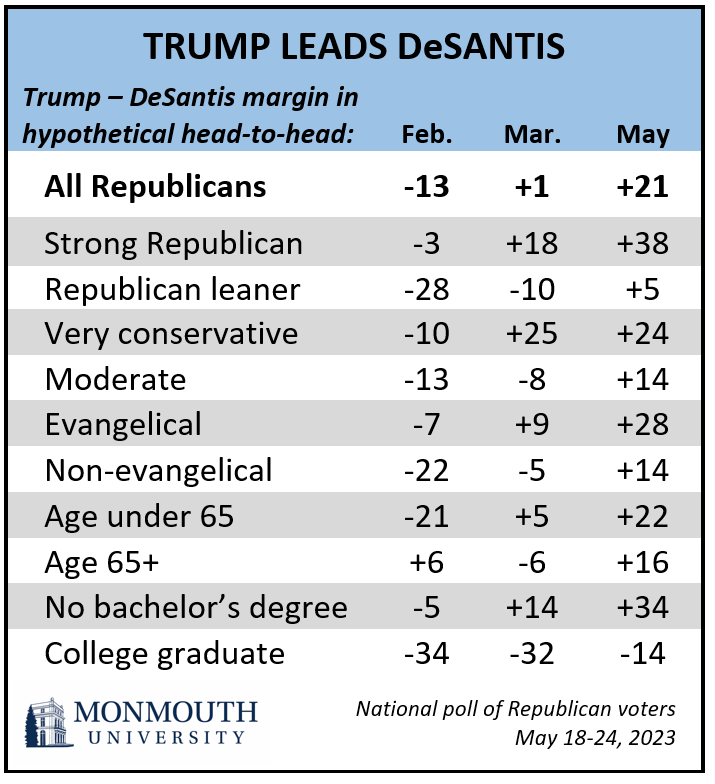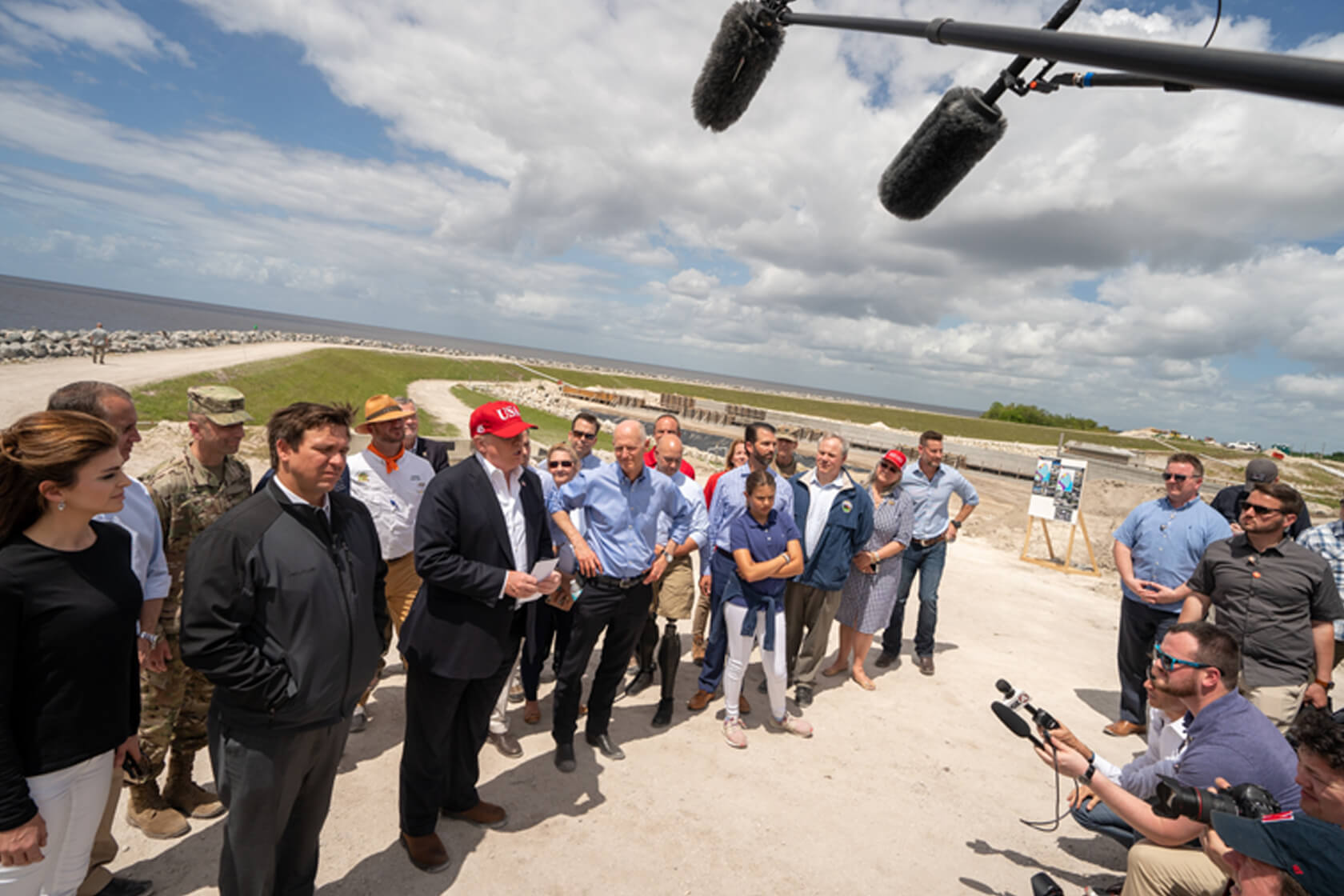West Long Branch, NJ – A majority of Republican voters feel former President Donald Trump would be their strongest nominee in the 2024 election. According to the Monmouth (“Mon-muth”) University Poll, Trump’s backing has remained firm while support for Florida Gov. Ron DeSantis has faded, even though he remains about as well liked as Trump among GOP voters. [Note: the interviews for this poll were completed before DeSantis officially launched his campaign last week.]
Nearly half (45%) of Republican voters – including those who lean toward the GOP – say Trump is definitely the strongest candidate to beat President Joe Biden in 2024, and another 18% think he is probably the strongest candidate. Just one-third of GOP voters say another Republican would definitely (13%) or probably (19%) be a stronger candidate than Trump.

Among voters who name Trump as their top-of-mind preference for the GOP presidential nomination, 74% say he is definitely the strongest candidate the party can put up against Biden and 21% say he probably is. Among those who express support for another candidate or have no choice at this stage, nearly 4 in 10 still feel Trump is either definitely (23%) or probably (16%) the strongest nominee the GOP can field. Only 22% of this group says the strongest Republican contender would definitely be someone other than Trump and 33% say it would probably be another candidate.
“If your main argument to Republican voters is that Trump wouldn’t be the party’s strongest nominee, you’ve got a heck of a challenge ahead of you,” said Patrick Murray, director of the independent Monmouth University Polling Institute. “There’s a bit of a chicken and egg problem with assessing electability. As we found in our polling during the 2020 Democratic primaries, if voters back a candidate based on issues or character they also tend to feel that candidate is the most electable. However, this still underscores the larger point in this poll. If your message to voters who support Trump is he cannot win, you are going to hit a brick wall. Even if you eat into the group who thinks he is only ‘probably’ the strongest candidate, you may still not capture enough of the Republican electorate to overcome Trump’s hardcore base support.”
When asked without any prompting whom they would like to see as the Republican nominee for president in 2024, 43% of GOP-aligned and leaning voters name Trump. This is similar to his 41% support level in March and up from prior polls (33% in February and 26% last December). DeSantis is named by just 19%, which marks a steady decline from 39% in December (including 33% in February and 27% in March). No other candidate breaks out of the single-digits as a top-of-mind preference for GOP voters, which has been the case since Monmouth started polling the 2024 contest late last year. Even in a hypothetical 4-person contest with named candidates, Trump (56%) and DeSantis (25%) command the lion’s share of support. The other specified candidates in this scenario, former Vice President Mike Pence and former U.N. Ambassador and South Carolina Gov. Nikki Haley, each muster just 7% support.
In a hypothetical head-to-head contest between just the top two contenders, 56% of GOP voters would choose Trump for the party’s nomination and 35% would pick DeSantis. Back in February, DeSantis (53%) had more support than Trump (40%). That shifted to an evenly divided contest in March (47% Trump and 46% DeSantis). Currently, Trump now holds an advantage in practically every Republican voting bloc, with the noticeable exception of college graduates. Three months ago, DeSantis led among major demographic groups within the party.

“DeSantis lost ground even before he got out of the starting gate. Republican voters still like him, but they haven’t heard a convincing case for why he would be the party’s best option,” said Murray.
The Monmouth University Poll also assessed GOP voters’ overall views of ten declared and potential Republican candidates for president in 2024. Republicans have overwhelmingly positive opinions of both Trump (77% favorable and 17% unfavorable) and DeSantis (73% favorable and 12% unfavorable). Among other announced candidates, two South Carolinians – Haley (47% favorable and 16% unfavorable) and Sen. Tim Scott (44% favorable and 8% unfavorable) – garner largely net positive reviews. However, about 4 in 10 Republican voters cannot provide a rating for Haley and just under half offer no rating for Scott. Business entrepreneur Vivek Ramaswamy (22% favorable and 6% unfavorable) and former Arkansas Gov. Asa Hutchinson (17% favorable and 14% unfavorable) are even less recognized, with 7 in 10 Republicans saying they have no opinion or have not even heard of either of these declared candidates.
Among those who are still mulling a presidential campaign, Pence and former New Jersey Gov. Chris Christie are the best known. Opinion of the former Vice President is mixed, but he emerges with a net positive review (46% favorable and 35% unfavorable). Christie, on the other hand, receives a decidedly negative rating (21% favorable and 47% unfavorable), and is the only contender of the ten tested in this poll who gets a net negative score from the Republican electorate. For the rest of the possible candidates included in the poll, Virginia Gov. Glenn Youngkin has a net positive rating (31% favorable and 8% unfavorable) with 6 in 10 having no opinion or awareness of him and New Hampshire Gov. Chris Sununu gets a split decision (15% favorable and 15% unfavorable), with 7 in 10 providing no rating of him.
The Monmouth University Poll was conducted by telephone and online from May 18 to 24, 2023 with 655 Republican and Republican leaning voters in the United States. The question results in this release have a margin of error of +/- 5.5 percentage points for the full sample. The poll was conducted by the Monmouth University Polling Institute in West Long Branch, NJ.
QUESTIONS AND RESULTS
(* Some columns may not add to 100% due to rounding.)
[Q1-9 & 18-23 previously released.]
[Q10-17 held for future release.]
24.Looking ahead, who would you like to see as the Republican nominee for President in 2024? [OPEN-END QUESTION. LIST WAS NOT READ]
| Trend: | May 2023 | March 2023 | Feb. 2023 | Dec. 2022 |
|---|---|---|---|---|
| Donald Trump | 43% | 41% | 33% | 26% |
| Ron DeSantis | 19% | 27% | 33% | 39% |
| Mike Pence | 3% | 1% | 2% | 2% |
| Tim Scott | 3% | 1% | <1% | <1% |
| Ted Cruz | 1% | 1% | 1% | 1% |
| Nikki Haley | 1% | 3% | 1% | 1% |
| Rand Paul | 1% | 1% | 1% | 0% |
| Vivek Ramaswamy | 1% | 0% | 0% | 0% |
| Others | 5% | 4% | 5% | 6% |
| (VOL) Don’t know | 23% | 23% | 24% | 25% |
| (n) | (655) | (521) | (566) | (563) |
25.I’m going to read you the names of some leaders in the Republican Party. Please tell me if your general impression of each is favorable or unfavorable, or if you don’t really have an opinion. If you have not heard of the person, just let me know. First, [READ NAME]. [NAMES WERE ROTATED]
| Trend: | Favorable | Unfavorable | No opinion | Not heard of | (n) |
|---|---|---|---|---|---|
| Former President Donald Trump | 77% | 17% | 6% | 0% | (655) |
| — March 2023 | 71% | 21% | 8% | 0% | (521) |
| — Feb. 2023 | 74% | 18% | 8% | 0% | (566) |
| Florida Governor Ron DeSantis | 73% | 12% | 11% | 3% | (655) |
| — March 2023 | 76% | 8% | 11% | 5% | (521) |
| — Feb. 2023 | 80% | 6% | 11% | 3% | (566) |
| Former Vice President Mike Pence | 46% | 35% | 18% | 0% | (655) |
| — March 2023 | 42% | 37% | 21% | 0% | (521) |
| — Feb. 2023 | 55% | 28% | 17% | 0% | (566) |
| Former South Carolina Governor and U.N. Ambassador Nikki Haley | 47% | 16% | 23% | 14% | (655) |
| — March 2023 | 45% | 16% | 23% | 16% | (521) |
| — Feb. 2023 | 47% | 11% | 22% | 19% | (566) |
| Business entrepreneur Vivek Ramaswamy | 22% | 6% | 26% | 46% | (655) |
| — March 2023 | 17% | 6% | 28% | 49% | (521) |
| — Feb. 2023 | n/a | n/a | n/a | n/a | n/a |
| South Carolina Senator Tim Scott | 44% | 8% | 28% | 20% | (655) |
| — March 2023 | 43% | 6% | 31% | 20% | (521) |
| — Feb. 2023 | n/a | n/a | n/a | n/a | n/a |
| Former Arkansas Governor Asa Hutchinson | 17% | 14% | 35% | 35% | (655) |
| — March 2023 | 18% | 9% | 45% | 29% | (521) |
| — Feb. 2023 | n/a | n/a | n/a | n/a | n/a |
| New Hampshire Governor Chris Sununu | 15% | 15% | 35% | 36% | (655) |
| — March 2023 | 15% | 16% | 32% | 37% | (521) |
| — Feb. 2023 | n/a | n/a | n/a | n/a | n/a |
| Former New Jersey Governor Chris Christie | 21% | 47% | 24% | 8% | (655) |
| — March 2023 | 24% | 42% | 28% | 6% | (521) |
| — Feb. 2023 | n/a | n/a | n/a | n/a | n/a |
| Virginia Governor Glenn Youngkin | 31% | 8% | 32% | 28% | (655) |
| — March 2023 | 34% | 7% | 31% | 28% | (521) |
| — Feb. 2023 | 36% | 8% | 30% | 26% | (566) |
26.Who would you choose if the candidates for the Republican nomination were Donald Trump, Ron DeSantis, Mike Pence, and Nikki Haley? [NAMES WERE ROTATED]
| Trend: | May 2023 | March 2023 |
|---|---|---|
| Trump | 56% | 44% |
| DeSantis | 25% | 36% |
| Pence | 7% | 7% |
| Haley | 7% | 6% |
| (VOL) None | 1% | 1% |
| (VOL) Don’t know | 5% | 5% |
| (n) | (655) | (521) |
27.Now, who would you choose if the candidates for the Republican nomination were Donald Trump and Ron DeSantis? [NAMES WERE ROTATED]
| Trend: | May 2023 | March 2023 | Feb. 2023 |
|---|---|---|---|
| Trump | 56% | 47% | 40% |
| DeSantis | 35% | 46% | 53% |
| (VOL) Neither | 3% | 2% | 2% |
| (VOL) Don’t know | 6% | 5% | 5% |
| (n) | (655) | (521) | (566) |
28.Regardless of whether you currently support Donald Trump, which of the following statements comes closest to your view about which Republican has the best chance to win in 2024: Donald Trump is definitely the strongest candidate to beat Joe Biden, Donald Trump is probably the strongest candidate to beat Joe Biden, another Republican would probably be a stronger candidate than Trump, or another Republican would definitely be a stronger candidate than Trump?
| Response: | May 2023 |
|---|---|
| Trump definitely strongest | 45% |
| Trump probably strongest | 18% |
| Another Republican probably stronger | 19% |
| Another Republican definitely stronger | 13% |
| (VOL) Don’t know | 4% |
| (n) | (655) |
29.Would you describe yourself as a born-again or evangelical Christian, or not?
| Trend: | May 2023 | March 2023 |
|---|---|---|
| Yes | 55% | 53% |
| No | 42% | 46% |
| (VOL) Don’t know | 3% | 1% |
| (n) | (655) | (521) |
[Q30-37 held for future release.]
Methodology
The Monmouth University Poll was sponsored and conducted by the Monmouth University Polling Institute from May 18 to 24, 2023 with a probability-based national random sample of 655 registered voters who identify with or lean toward the Republican Party. Interviews were conducted in English, and included 206 live landline telephone interviews, 305 live cell phone interviews, and 144 online surveys via a cell phone text invitation. Telephone numbers were selected through a mix of random digit dialing and list-based sampling. Landline respondents were selected with a modified Troldahl-Carter youngest adult household screen. Interviewing services were provided by Braun Research, with sample obtained from Dynata (RDD, n= 274), Aristotle (list, n= 316) and a panel of prior Monmouth poll participants (n= 65). Monmouth is responsible for all aspects of the survey design, data weighting and analysis. The full sample is weighted for region, age, education, gender and race based on voter list and US Census information (ACS 2021 one-year survey). For results based on this sample, one can say with 95% confidence that the error attributable to sampling has a maximum margin of plus or minus 5.5 percentage points adjusted for sample design effects (1.44). Sampling error can be larger for sub-groups (see table below). In addition to sampling error, one should bear in mind that question wording and practical difficulties in conducting surveys can introduce error or bias into the findings of opinion polls.
DEMOGRAPHICS (weighted) |
| Self-Reported |
| 51% Strong Republican |
| 16% Republican, not strong |
| 33% Independent, lean Rep. |
| 53% Male |
| 47% Female |
| 15% 18-34 |
| 24% 35-49 |
| 32% 50-64 |
| 29% 65+ |
| 80% White |
| 12% Hispanic |
| 8% Black/Asian/Other |
| 40% High school or less |
| 32% Some college |
| 28% 4 year degree |
Click on pdf file link below for full methodology and crosstabs by key demographic groups.




